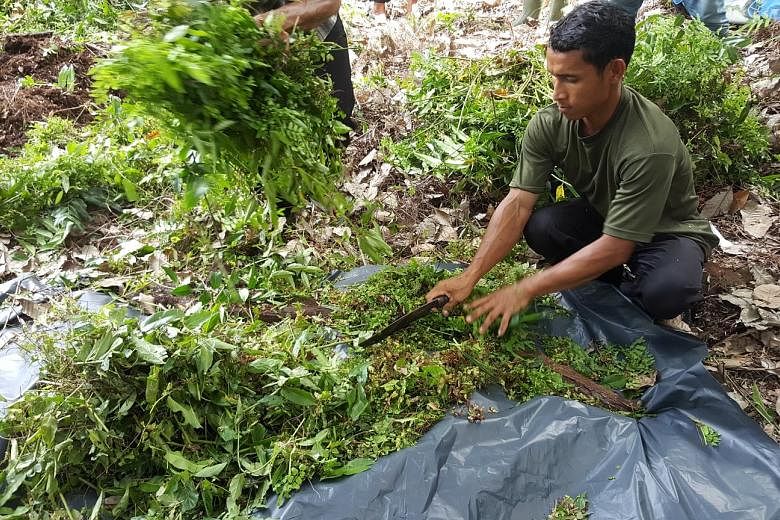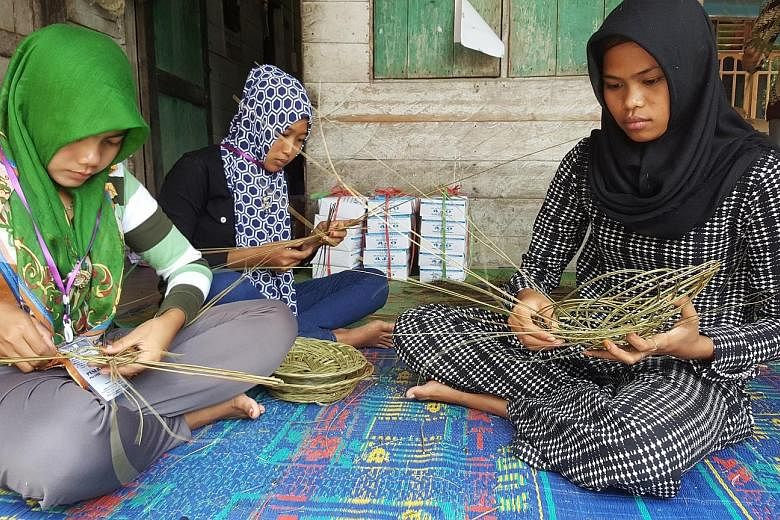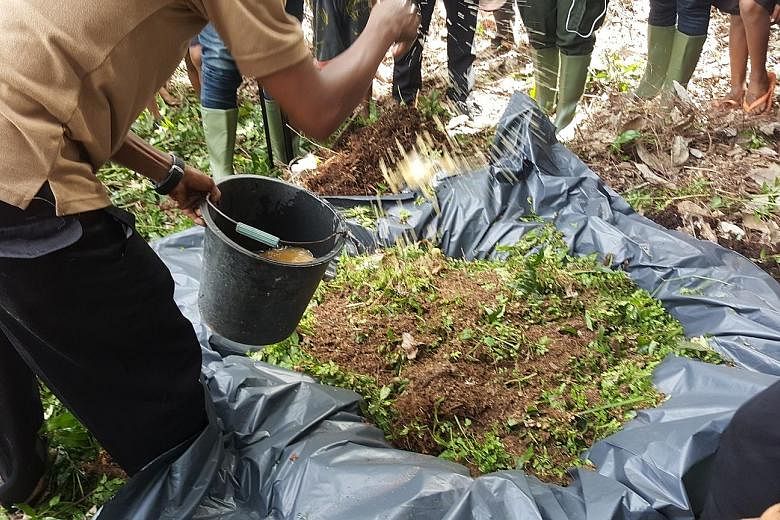For the past several months, farmers in a small village in Riau province have been learning to clear their land without burning.
They hack away at overgrown shrubs and weeds in a field, shred them and then pile them into a hole in the ground.
As if making a giant bowl of salad, they toss in chicken manure, rice water and brown sugar. The mixture is then shovelled onto plastic sheets and wrapped up.
"Composting is new to me. I was sceptical it would work at first but now that I know it's possible, I will not use fires any more," one of the farmers, Mr Misianto, told The Straits Times.
The hope is that come April, when the dry season returns, their village will not have to face crippling haze again.
"The dry season is from April to October so there's potential for fires from June to September," said Dr Sutopo Purwo Nugroho, spokesman for Indonesia's National Disaster Management Agency (BNPB).
Hot spots have in fact reappeared for the first time this year, with the highest number so far recorded on Jan 10 - there were 15 in Sumatra while another four were in Riau.
While officials say the haze crisis of 2015, the worst in the region's history, is unlikely to recur this year, the people behind grassroots fire prevention and management programmes - such as the one introduced in Desa Menggala Teladan - are not sitting on their hands.
Throwing a lit match to clear land like the farmers had always done would have been simpler and cheaper, but the men have vowed not to slash-and-burn any more, even if it is not illegal for small- scale farmers like them to burn up to 2ha to prepare the soil for new crops.
Their village is in Riau's Rokan Hilir regency - notorious as being the centre of hot spots each year largely due to widespread land clearing by small-scale farmers using the slash-and-burn method.
So, when researchers from the provincial University of Riau (Unri) approached the villagers with an alternative "no-burn" method to clear their land last year, they said "yes".
The farmers were taught to turn their vegetative debris and wood waste into fertiliser for their crops. Thicker pieces of wood were sold to furniture-makers and oil palm leaf stalks were woven into baskets and other handicrafts.
Unri researchers also organised the farmers into groups and taught them basic firefighting using simple yard tools such as backpack water sprayers, pails and hoses.
These farmers operate on a small scale. They typically own less than a hectare to several hectares of land on which they grow vegetables and fruits or cash crops such as rubber and oil palm, earning between $100 and $200 a month.
Composting waste from 2ha of land - the same area that would have been burned - typically costs around 150,000 rupiah (S$16), which is more expensive than a box of matches but still pocket-friendly.
"I need to tidy up my farm only once a year and the price is not too much. Most farmers can afford that," said Mr Misianto.
The 43-year-old had been torching his 2ha oil palm and rubber tree farm every year for the past decade but felt compelled to change after having to send his wife and three children away to stay with relatives to avoid the haze in 2015.
As millions living in South-east Asia, including Singapore, complained of sore eyes, blocked noses and itchy throats, life almost came to a standstill for some 2,000 residents in the farming village, which is surrounded by oil palm plantations.
Schools were forced to close. Clinics overflowed with patients. Many residents escaped to less polluted towns. There was at least one report of death.
The crisis cost Indonesia around 221 trillion rupiah in losses and sparked diplomatic tensions with its neighbours.
"It's not as if we like to see people suffer. We burn because we don't know a better option," another farmer, Mr Rusmanto, 55, said.
"We had been blind to technology and modern techniques, but now, we want to be a 'fire-free' village," he added.
'FIRE-FREE' VILLAGES
The Unri initiative is an example of grassroots anti-haze efforts in Indonesia which emerged in the 2000s but were promoted with renewed fervour after the 2015 crisis.
In the past year, oil palm and pulpwood companies, environmental groups and industry associations have trumpeted their commitment to fire-prevention efforts by helping villages to adopt zero- burning practices and thus become "fire-free".
While programmes vary, the core elements are the same: Villagers are taught to prevent fires by adopting greener farming methods and manage them with basic firefighting knowledge and skills.
Minamas Plantation, the Indonesian subsidiary of Malaysia's Sime Darby, has tied up with local universities to help develop 15 "fire-free" villages - like Desa Menggala Teladan - in Riau and Kalimantan provinces.
Singapore-based palm oil company Cargill has teamed up with experts from the Environment and Forestry Ministry to supply 26 villages in South Sumatra and West Kalimantan with water pumps and hoses.
Under a programme by pulp and paper giant April, villages which successfully stay "fire-free" could receive a reward of 100 million rupiah, which will go towards community infrastructure or firefighting equipment.
"We aim to motivate behavioural change in communities," said Ms Ginny Ng, forest sustainability manager from agribusiness group Wilmar International, which supports 65 villages in South Sumatra and Central Kalimantan.
CHANGING MINDSETS
The ground-up approach, which tries to tackle the fire problem at its root, is not easy to implement and takes a long time to produce results.
"Over 90 per cent of fires globally result from the actions of people, so the understanding of the motivations of the people in the landscape under consideration is critical," Mr Peter Moore, who oversees the fire management programme at the Food and Agriculture Organisation of the United Nations, told The Straits Times.
"This usually takes considerable time, careful consultation and detailed analysis."
Agreeing, Unri agrotechnology lecturer Besri Nasrul said: "What works well in Vietnam might not work in Indonesia. We also need to gain the community's trust before they would accept our ideas," he said.
"Changing mindsets is the most difficult."
The villagers of Desa Menggala Teladan, for example, were convinced to put the "no-burn" idea into practice only after three months, despite being keen on it initially.
Another problem, say critics, is that companies tend to sponsor only villages close to their concessions.
This means most villages which practise slash-and-burn are not exposed to "fire-free" programmes.
The fact that people are still burning and the haze problem has persisted over decades means the programme needs the might of the government to make it more effective, said Mr Isnadi Esman of local group Riau Network of Peatland Communities.
He said: "There's no national programme. No national standard means no minimum criteria, so anybody can make grand claims.
"But giving one to two water pumps to the entire village is hardly enough to put out any serious fire."
THE HEAT IS ON
The Indonesian government announced last month its own village-based fire prevention programme, which will be developed in 66 cities or districts and 731 villages across seven provinces beginning this year .
President Joko Widodo has also signed an immediate and total ban from Dec 1 last year on the cultivation of peatland.
The Coordinating Ministry for Economic Affairs' deputy overseeing food and agriculture coordination, Ms Musdhalifah Machmud, told The Straits Times: "Fires have been happening for 18 years, and prevention must begin from the community.
"We should not be putting out fires as they happen. This must be done much earlier. There isn't a national standard so now we are making one."
Forestry experts say communities can only help to reduce the incidence of fires, but not eradicate them.
Strong law enforcement against illegal fire setters, including rogue palm oil producers, remains key in tackling the perennial haze problem.
"It's going to be hard for the government to cover all villages," said Professor Herry Purnomo, a scientist at the Centre for International Forestry Research.
"Many mid-sized companies and tycoons are still involved in burning so the focus must still be on law enforcement."



